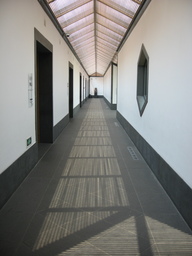
Suzhou Museum
 Suzhou Museum |
I've just finished up my second stint of couchsurfing. I stayed with Trevor, an Australian who teaches Grade 3 at the Suzhou International School. As opposed to my couchsurfing experience in Hangzhou, my host was both present at home and able to show me around town.
Trevor and I spent Wednesday night socializing with his co-workers, a crowd of elementary-school teachers hailing from western countries. We started with a drink at an ex-pat pub, The Blue Heron, followed by dinner. The company was pleasant, though I felt disoriented chatting with Trevor's co-workers: they were such a different set from the foreigners who stay long-term in Urumqi. They were nice, friendly people, the majority Canadian and Australian. Most had lived in Suzhou for several years, teaching elementary school to the children of expatriates. The main difference between the teachers I met and the foreigners I know back up in Urumqi was that nobody I spoke with around Suzhou had any Chinese language skills beyond ni hao. Most had never heard of the Uighurs, many had never explored China at all. Several people I chatted with had never ventured further than Shanghai, 45 minutes away by the new bullet-train.
It's easy for me to forget how different the east coast of China is. There aren't a lot of plum ex-pat jobs in Urumqi, let alone enough that would create a solid community. What foreign community there is back in Urumqi is more fragmented: the 20-somethings teaching English have their haunts (presently Uncle Bob's Cafe and the Fu Bar), the missionaries take their families to the kid-friendly places around town (e.g. The Vine, Rendezvous) and the western students attending Xinjiang University seem to be more about meeting up over Frisbee with occasional gatherings hosted at somebody's flat.
Exploring Suzhou, I've been surprised by how modern and clean this corner of China is. Trevor's school and apartment are removed from the city, both located in a newly-built suburb planned by foreign developers from Singapore. The area reminds me of Japan in certain ways: orderly traffic, higher-quality materials used in construction, trim strips of restaurants and bakeries offering everything from sushi to Papa John's Pizza: I feel like I've left China for a time.
Suzhou has a rich history even by Chinese standards, the city has long been famed for its traditional gardens. Entrance prices to visit the gardens are steep but I did enjoy the two I visited, the Garden of the Humble Apprentice and the Garden of the Master of Nets. I tried as I could to appreciate the minimalist aesthetic upon which traditional Chinese gardens are constructed--they're not like the gardens in the west with colorful flowers at every turn. Rather, trees, ponds, bridges, and pagodas are all placed with deliberation--working to effect a sense of serenity. There are large open patches of gravel in places. I spent two days poking around, lingering in the corners of the gardens that seemed pleasant. The buildings on the grounds were lovely, several had fine examples of calligraphy hanging inside: always an added attraction for me.
There's never a tour group far away from any attraction in China, usually being led by a guide speaking through an electronic megaphone. Despite these groups barking their way across the gardens every so often, I did enjoy my visits. The gardens were outstanding, I will make return visits if I ever pass through Suzhou again.
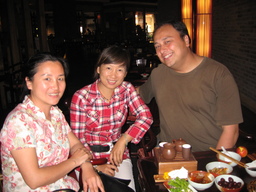 Evy, Xiao Fang, & David |
While out in this corner of the country I managed to squeeze in a trip to see Zach in nearby Hengdian, the movie capital of China. In recent years more and more films have been shot down in Hengdian, Zach will be working there for several months on a shoot. I spent only one night in Hengdian, deciding to focus my time on just hanging out with Zach rather than visiting any of the movie sets around town.
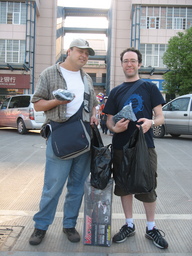 David & Zach |
The silliest was yet to come. The next day Zach, his boss, and I went shopping around Yiwu, a city just outside of Hengdian. Yiwu is the place everybody outside of China comes to to buy goods in wholesale. Block after block of multi-level shopping malls cover the city. In each building are stall upon stall specializing in some specific product niche: rubber balls, Christmas paraphernalia, wrenches. Signs were written for customers in languages usually seen far across the globe. Back in Urumqi I often see Russian alongside Uighur and Chinese, though seldom see Arabic or Japanese, both common around Yiwu.
Zach and his boss were shopping for remote-controlled toy helicopters. I set out on a hookah hunt: I found several stalls with beautiful pipes at reasonable prices. I spent a fair while talking with the proprietor of a stall which had great variety, her opening offer for a complete hookah set including all accessories was 103 RMB, about $13.50 U.S.. She had models and designs I'd never imagined, including one with an ornate yin-yang symbol crafted into its stem. The only reason I didn't buy one to replace my worn hookahs back home is because sellers in Yiwu deal in volume only. Her minimum purchase was six hookahs. Even at such a cheap price, I couldn't justify it to myself.
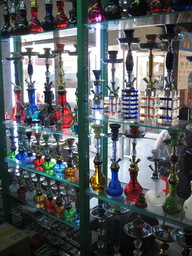 Hookah Wholesale |
Zach and I were both looking around the shops of Yiwu for a certain model of compass we use when traveling. They're practical and cheap, even when not buying at wholesale prices. Each compass is mounted onto a small slip which slides onto the band of a wristwatch. I don't know how many times I've used one of these little watchband compasses to orient myself upon arriving in some unfamiliar city. Useful as they may be, these are not high quality products: after being worn on a watchband for a year or two, little bubbles develop which interfere with proper orientation. My last compass decided to consistently point south-southwest after several months of usage. Others fail outright, the needle no longer following any consistent direction. They're great when they work, but they're also cheap and can't be used forever.
Zach and I figured that ten to a dozen of these would be enough to keep us each happy for years. However, the workers at the compass stalls didn't think 10 or even 20 of these cheap little compasses qualified as wholesale. They were dismissive, insisting that it wouldn't be worth their while to sell so few of such a cheap product. "Look guys, we're not going to sell you 8 or 10 of these," one of the shopkeepers chided us. "Our minimum volume is 1,000, at 2 mao each."
Neither Zach nor I were interested in buying a thousand compasses. We figured we would have to find some other compass stall, but the entire mall was closing right then. Then we did the arithmetic: 2 mao times 1,000 compasses equals 200 yuan. If we went halves on the purchase, that would be 100 yuan each, about $13 USD--we could each take away 500 compasses. We decided it was worth it to go for the whole thousand.
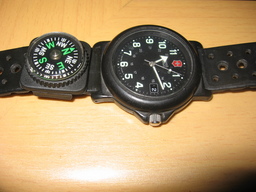 Wristwatch Compass |
Suzhou Museum 204 Dong Bei Jie, Suzhou +86 (512) 6757-5666
Blue Marlin 98 Shi Shan Road SGV SND, Suzhou +86 (512) 6808-7316
Qing Teng Teahouse Liu Ying Road, Hangzhou +86 (571) 8702-2777
Hookah Wholesale Shop Futian Market, Section 1 Area D 3rd Floor Stall 8349, Yiwu +86 (579) 529-0580